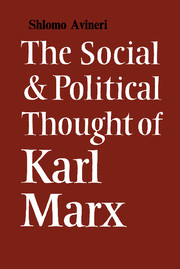Epilogue: the eschatology of the present
Published online by Cambridge University Press: 05 June 2012
Summary
It seems that the intellectual achievement of Marx's thought is also its main weakness in precisely that sphere in which Marx considered his theory to have achieved a major breakthrough towards historical realization. Marx arrives at the philosophical meaning of the revolution by confronting Hegel's philosophy with the contemporary reality which it sought to justify and legitimize. This strategy distinguishes Marx's theory of revolution from most other nineteenth-century revolutionary theories, for they either deduced the revolution from a priori principles whose relation to reality was based on a mere negation of it, or limited themselves to merely empirical analysis of contemporary reality. Marx's breakthrough from philosophical theory to a praxis possessing a social, historical subject whose legitimacy it justifies in terms of the theory is doubtless a turning point in nineteenth-century history. Wedding socialism to the proletariat, it gave historical meaning to the conscious social organization of the working class. The lot of the proletarians thus ceased to be the affair of the workers themselves and forced its way into world history.
Precisely here the internal weakness of Marx's thought is most evident. Turning the possibility of human redemption into an historical phenomenon about to be realized here and now secularizes the Hegelian synthesis that saw the dialectical tensions resolving themselves in the present generation and finding their Aufhebung in an apotheosis through which the historical process would achieve its ultimate height.
- Type
- Chapter
- Information
- The Social and Political Thought of Karl Marx , pp. 250 - 258Publisher: Cambridge University PressPrint publication year: 1968



